| Srl | Item |
| 1 |
ID:
075420
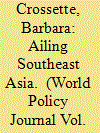

|
|
|
| 2 |
ID:
075455
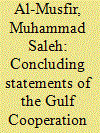

|
|
|
| 3 |
ID:
177037
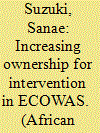

|
|
|
|
|
| Summary/Abstract |
After the Cold War, not only the United Nations (UN) but also regional organisations began to engage in the internal conflicts of their member states. The Economic Community of West African States (ECOWAS) has long intervened in West African conflicts, and institutionalised its approach to interventions in 1999. Since then, member states have maintained and even increased their commitment to managing conflicts in West Africa regionally – a willingness that implies their ownership of interventions. This article argues that ECOWAS member states share ownership because they have developed a common understanding about intervention. The development of this common understanding is analysed with a focus on the origin and evolution of ECOWAS, that is, on the multi-level process of generating consensus and on the principle and practice of sharing the costs of resource mobilisation. I will show that, in practice, these processes led each state to perceive an enhanced sense of ownership in ECOWAS interventions. Case studies of ECOWAS interventions in Liberia, Sierra Leone, Guinea-Bissau and Cote d’Ivoire in the 1990s and the 2000s, the period when the organisation’s interventions became institutionalised, support the argument.
|
|
|
|
|
|
|
|
|
|
|
|
|
|
|
|
| 4 |
ID:
192907
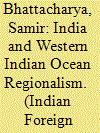

|
|
|
|
|
| Summary/Abstract |
With the world system moving from a bipolar to a multipolar structure,
and the world agenda shifting from narrow high-politics to lowpolitics, there is a need to critically examine the impact of emerging
countries on regionalism and the regional systems of the Global South.
Uplifted by its economic growth, India is exerting to play a more
active role beyond its immediate neighbourhood by developing critical
partnerships with regional and extra-regional players. As a result of
India’s expanding ties with the Vanilla Island countries, India has
recently been accepted as an observer in the Indian Ocean
Commission. While France has traditionally dominated this region
due to its shared history, China has also been increasingly asserting
its position here. Against the backdrop of Chinese presence continuing
to shore up as well as the mounting tension between the USA and
Iran over the Mozambique Channel, the competition between these
powers could spill over into the region and impact the peace, stability,
and ongoing constructive cooperation efforts. This essay takes India
as a case study, and attempts to determine the impact of India’s
assertive policies in the region. By examining the theoretical constructs
of regionalism, the paper examines the impact of India’s increasing
assertiveness in the region, and its impact on WIO regionalism at a
theoretical as well as empirical level.
|
|
|
|
|
|
|
|
|
|
|
|
|
|
|
|
| 5 |
ID:
148133
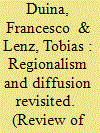

|
|
|
|
|
| Summary/Abstract |
An emerging research programme on diffusion across regional international organisations (RIOs) proposes that decisions taken in one RIO affect decision-making in other RIOs. This work has provided a welcome corrective to endogenously-focused accounts of RIOs. Nevertheless, by focusing on the final design of policies and institutional arrangements, it has been conceptually overly narrow. This has led to a truncated understanding of diffusion’s impact and to an unjustified view of convergence as its primary outcome. Drawing on public policy and sociological research, we offer a conceptual framework that seeks to remedy these weaknesses by disaggregating the decision-making process on the ‘receiving’ side. We suggest that policies and institutional arrangements in RIOs result from three decision-making stages: problematisation (identification of something as a political problem), framing (categorisation of the problem and possible solutions), and scripting (design of final solutions). Diffusion can affect any combination of these stages. Consequently, its effects are more varied and potentially extensive than is currently recognised, and convergence and persistent variation in scripting are both possible outcomes. We illustrate our framework by re-evaluating research on dispute settlement institutions in the EEC, NAFTA, and SADC. We conclude by discussing its theoretical implications and the conditions that likely promote diffusion.
|
|
|
|
|
|
|
|
|
|
|
|
|
|
|
|
| 6 |
ID:
074390
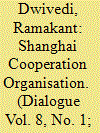

|
|
|
| 7 |
ID:
075236
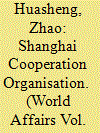

|
|
|
|
|
| Publication |
2006.
|
| Summary/Abstract |
The Shanghai Cooperation Organisation (SCO) is intended to improve the security of its member states and foster economic cooperationbetween them. Though the fight against terrorism, separatism and religious extremism remains its primary function, Zhao Huasheng notes that other purposes have been added to the common agenda, such as the repression of the drug trade and organised crime, ensuring the departure of non member military forces stationed in SCO states, building up trade and investment and setting up an energy exporters and consumers club..
|
|
|
|
|
|
|
|
|
|
|
|
|
|
|
|